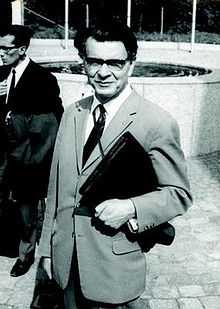Helmut Grunsky

Helmut Grunsky in Eichstatt in 1968
Helmut Grunsky (11 July 1904 in Aalen — 5 June 1986 in Würzburg) was a German mathematician who worked in complex analysis and geometric function theory. He introduced Grunsky's theorem and the Grunsky inequalities.[1]
In 1936, he was appointed editor of Jahrbuch über die Fortschritte der Mathematik. In 1939 he was forced to leave this position after Ludwig Bieberbach accused him of employing Jewish referees in a notorious letter.[2] He joined the Nazi Party on 1940 April 1, though he seems to have had little sympathy with its philosophy. From 1949 he was Privatdozent at the University of Tübingen; later, he was professor at the University of Mainz and at the University of Würzburg.
Works
- Collected Papers. Lemgo 2004.
- Lectures on theory of functions in multiply connected domains. Vandenhoeck & Ruprecht, Göttingen 1978.
- The general Stokes Theorem. Pitman, Boston 1983.
- In 1968 Grunsky edited Vorlesungen über Invariantentheorie von Issai Schur for the Grundlehren der Mathematischen Wissenschaften, Springer-Verlag.
- Neue Abschätzungen zur konformen Abbildung ein– und mehrfach zusammenhängender Bereiche. Dissertation.
- Koeffizientenbedingungen für schlicht abbildende meromorphe Funktionen. In: Mathematische Zeitschrift. Vol. 45, 1939.
Sources
- Grunsky, Helmut (2004), Ruscheweyh, Stephan; Roth, Oliver, eds., Helmut Grunsky: collected papers, Lemgo, Germany: Heldermann Verlag, ISBN 978-3-88538-501-1, MR 2083061
- Jenkins, J. A. (1989), "Helmut Grunsky", Jahresbericht der Deutschen Mathematiker-Vereinigung 91 (4): 159–167, ISSN 0012-0456, MR 1027062
Notes
- ↑ Jenkins (1989)
- ↑ See Reinhard Siegmund-Schultze, "Helmut Grunsky in the Third Reich" in Grunsky (2004)
External links
- O'Connor, John J.; Robertson, Edmund F., "Helmut Grunsky", MacTutor History of Mathematics archive, University of St Andrews.
|